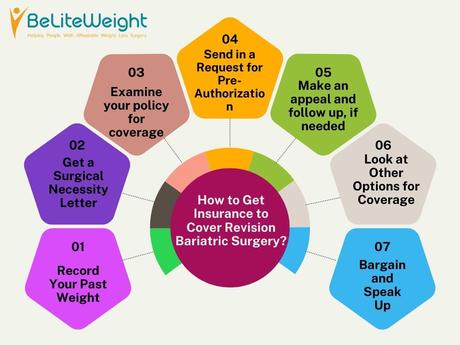Introduction
Have you struggled to lose weight after bariatric surgery? Or maybe you lost weight initially but have started regaining it? Then you are not a single person. In their quest to lose weight, many people encounter obstacles even after undergoing bariatric surgeries. But because bariatric revision surgery offers a new beginning, there is still hope.
The number of people who are obese is constantly increasing, but bariatric surgery has made countless people healthier. But occasionally, the initial surgery doesn't go according to plan.
Patients may not lose enough weight, regain what they lost, or develop complications. When this happens, bariatric revision surgery provides an opportunity to get back on track.
Thanks to technological improvements and talented doctors, your weight loss journey can be restarted with this "second chance" procedure. You can still achieve your goals even if the first operation wasn't the best option. Have faith in yourself.
But revision surgery allows you to reclaim your health journey. If the first procedure wasn't the final answer, take heart - there are still paths forward toward your goals.
What is Bariatric Revision Surgery?

Bariatric revision surgery is also known as revisional bariatric surgery. It is a procedure performed to correct or modify a previous weight loss surgery. Especially the revision is done for the surgeries that have failed to produce satisfactory results. Also, another reason can be post-operational complications. It involves changing or converting the first bariatric procedure to another type of surgery.
Why Might You Need a Revision?
Bariatric revision surgery can prove necessary for a variety of reasons. Let's investigate more closely.
- Not Losing Enough Weight: Occasionally, the anticipated quantity of weight loss following the initial weight loss surgery may not be achieved. A revision treatment can be necessary to help you meet your goals if you haven't lost much weight or have gained back most of what you lost following your first surgery.
- Weight Regain: Whether or not you were able to effectively lose weight after your initial surgery, some patients find that over time, the pounds progressively return. A slower rate of metabolism, dietary changes, and a host of other factors can lead to weight increase.
- Effects or complications following bariatric surgery might involve intestinal blockages. Also, you can get hernias or dietary deficits. If you are facing these kinds of problems, a revision technique is the best to solve the issue.
- Stretch of the Stomach: In certain instances, the sleeve or pouch during the first surgery may gradually expand. It allows you to consume more food. As a result, you put on weight. The good news is, you can now easily correct it with revision surgery. Through which it tightens or shrinks the stomach pouch.
- Change in Treatment Type: If the first bariatric procedure did not go well for you, your surgeon may recommend an alternate procedure, such as switching from a gastric band to a sleeve gastrectomy or gastric bypass.
- Handling issues: Surgical intervention may be necessary in certain instances to address issues including intestinal obstructions, stomach pouch growth, or leakage of staple lines in order to restore your health.
The decision to have bariatric revision surgery is a private one that has to be discussed in-depth with your medical professional. They can evaluate your particular situation and decide if a revision procedure is the best course of action for reaching your long-term goals for improved health and weight loss.
How to Get Insurance to Cover Revision Bariatric Surgery?
Here is a step-by-step process for how to get insurance to cover revision bariatric surgery:

Begin by gathering a thorough history of your weight, including information on your first bariatric procedure, the weight you lost, and any weight gain or failure to reach your target weight. This paperwork will be used to substantiate the revision procedure's medical necessity.
Set up a consultation with your healthcare physician or bariatric surgeon. Talk about the reasons you need a revision surgery during this visit, as well as any possible health advantages. Get your surgeon to write a thorough letter of medical necessity outlining these reasons and fervently supporting the revision treatment.
Examine your current insurance policy in detail, being especially aware of the parts pertaining to weight loss or bariatric surgery. Check for any particular revision process requirements, exclusions, or criteria. Note any co-payment obligations, deductibles, or pre-authorization procedures that you may need to complete.
Make sure your pre-authorization request for the revision of bariatric surgery is ready and submitted in accordance with the guidelines provided by your insurance coverage. Your whole medical file, your surgeon's certificate of medical necessity, and any other paperwork or forms needed by your insurance company should all be included in this request.
Check in with your insurance provider after submitting the pre-authorization request to be sure they have received all the required data. Do not give up if your initial request is turned down. Write a formal appeal letter emphasising the revision procedure's medical necessity and any more supporting documentation you may have.
Look into other choices if your insurance company keeps refusing to pay for the revision bariatric surgery. Among the options are:
- Medicaid coverage (each state has different policies and eligibility)
- Private insurance policies or employer-sponsored health programs
- The surgical facility's funding alternatives for medical care or payment arrangements
Be a proactive defender of your health and well-being at all times. Engage in negotiations with your insurance company, highlighting the revision procedure's long-term cost-effectiveness in averting future health issues brought on by obesity or unsuccessful weight-loss surgery.
Recall that getting insurance for revision bariatric surgery can be a difficult and drawn-out process, but your chances of success can be increased with persistence and a strong case. Work closely with your medical team and take the initiative to navigate the insurance system.
Types of Bariatric Revision Surgeries

Revision surgery recommendations are based on your initial procedure, current health, and desired weight loss outcome. Typical choices include the following:
Revision of Gastric Bypass: It involves switching or converting from one type of gastric bypass surgery to a different one, like a duodenal switch or gastric band removal.
Revision of Gastric Band: Here you can find the elimination or alteration of a gastric band that has resulted in difficulties or did not produce the expected outcomes.
Gastric Sleeve Revision: It involves none other than switching from a gastric sleeve surgery to a different one. The duodenal switching procedure or that of a gastric bypass.
Local Bariatric Revision Surgery Near Me
Finding a qualified and popular bariatric surgeon in your area is crucial. Especially when you're thinking about having a bariatric revision surgery. Some of the best surgical centers and hospitals, even ones in big cities like Dallas, provide these procedures. You can now explore bariatric revision surgery Dallas with ease.
Cost of Bariatric Surgery Revision

A number of factors are involved in the procedure, from the type of treatment and location to insurance coverage. Bariatric revision surgery may involve widely different costs. Without cover from insurance, the average cost could fluctuate from $15,000 to $30,000 or more.
Our Bariatric Surgery Before and After / Patient Testimonials

Hi,
I didn't begin putting on extra weight until after high school. I was very active playing basketball and softball so extra pounds had never been a concern for me. Over the next couple of decades, I would lose and gain the same weight using all the fads and pills. I finally made the decision in 2020 to have Gastric Sleeve Surgery. BeLiteWeight was recommended by a colleague and so began my journey..... Read More
Our 10000+ Patient Testimonials= Click HareConclusion: Choosing Wisely
Making the choice to have bariatric revision surgery is an important decision which has to be thoroughly thought through and backed by your medical team. Before continuing, it is crucial that you carefully weigh the dangers and possible advantages and obtain an accurate grasp of the procedure.
Recall that bariatric revision surgery can provide you a second opportunity to reach your weight loss objectives and enhance your general health and well-being. You can take on this adventure with confidence with us at https://www.beliteweight.com/%20membership/ if you have the correct support and direction.
FAQs (Frequently Asked Questions)
How to get insurance that covers revision bariatric surgery?Document weight history, obtain medical necessity letter from a surgeon, review policy requirements, submit a pre-authorization request, appeal denials, and explore alternative coverage options.
What is bariatric revision surgery?A second procedure was carried out to alter or rectify a first weight reduction procedure that resulted in problems or failed to produce the expected long-term benefits.
What is revision bariatric surgery?It involves revising or converting the initial bariatric procedure to a different type of surgery to help achieve better weight loss outcomes.
How much does bariatric surgery cost?The revision bariatric surgery cost can vary significantly, based on the treatment kind, location, and insurance coverage, and can range from $15,000 to $30,000 or more.

